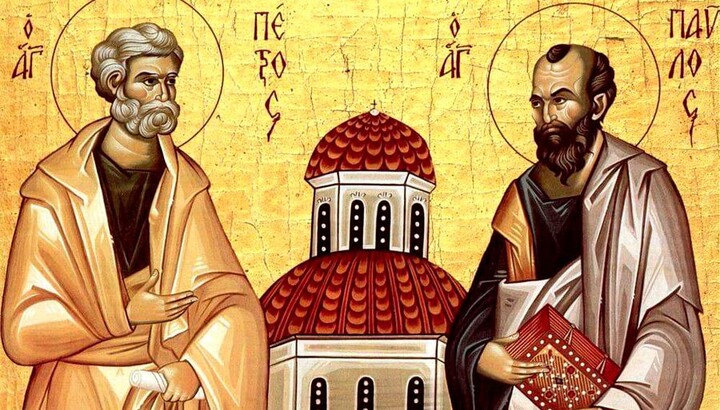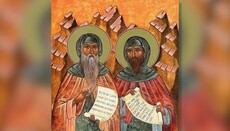Peter and Paul – two very dfferent stones in the foundation of the Church

It’s hard to find two people more different from one another than the Chief Apostles Peter and Paul. They differed in social background, education, life experience, profession, and so much more.
Yet the Lord laid these two dissimilar stones as the foundation of His Church. What bound them together was the grace of God, their deep humility, and their sense of unworthiness to receive this grace. That is where the greatness and beauty of the apostles lie.
The Apostle Paul
Saul was an educated theologian with high social standing for his time. He also inherited Roman citizenship from his father, giving him considerable authority in society. Moreover, Saul was a radical zealot for Judaism, ready to use any means against those he saw as threats to his religious tradition. He had every reason to build a successful career and live comfortably, as we say. But he considered all of it rubbish – or, as the Greek text literally says, skubalon (manure, refuse), which the Synodal translation modestly renders as “vanity.”
The revelation Saul received on the road to Damascus changed his entire life. We can’t truly imagine the depth of the transformation he underwent.
Later, he would quote Christ’s words and speak of Him as if he had stood beside the Savior every moment of His earthly life. This mystical-theological insight into the very heart of Christ’s sacrifice was granted to him as a great gift of the Holy Spirit.
But having received this priceless gift, how did Paul see himself? He saw himself as Saul, who approved the killing of the Protomartyr Stephen. He remembered himself breathing threats and murder against the Lord’s disciples, thirsting for their blood. The stark contrast between who Paul became and who Saul was humbled him so deeply that this Chief Apostle considered himself the least of the apostles, unworthy even to bear the name. Yet he also understood that he had become an illustration of God’s power to save from any depth of sin.
It was not his education at the feet of Gamaliel, not his learning or erudition, that made Paul a chief apostle, but his profound humility and God’s grace.
The Theology of Silence
Paul’s epistles were difficult to understand even for his contemporaries, and they remain so for us. They often seem unsystematic – like sketches or strokes on a theological painting that was never completed. Perhaps the apostle truly expected, as he writes in his letters, that Christ’s second Coming would happen very soon and therefore didn’t worry about systematizing the Gospel revelation.
Or perhaps the issue was something else. What cannot be grasped by the mind must be understood by the heart, in the practice of spiritual life.
True theology does not lead the soul to words about God but to silence before Him. The one who knows God becomes silent. The one who prays prefers to hear God in silence rather than speak about Him.
“Words are the tools of this age, but silence is the mystery of the age to come,” teaches St. Isaac the Syrian. Our tongue is mute; it has no words to convey true knowledge of God. Our so-called “theological knowledge” is merely a map pointing to the territory, but not the territory itself. It has value –just as a cane is valuable for the blind, giving him a way not to fall or lose his path. But that doesn’t mean the cane lets him see the world – it only helps him move in the right direction.
The fact that our Orthodox internet is full of “talking heads” who claim to have answers to everything about God is a clear sign of the degeneration of bookish theology. If it were truly developing in a healthy way, we would see ever more people who fall silent, having tasted the sweetness of stillness and thoughtlessness in prayer – not those who endlessly talk about God without knowing Him, and those who love listening to such chatterers without end.
The Apostle Peter
Peter was nothing like Paul. He was a simple fisherman. Most likely, he could neither read nor write. He was an unlearned and unlettered man. Yet, as we see in his sermons in Acts and in the letters attributed to him, Peter could speak clearly and persuasively. He had a wife, and Eusebius of Caesarea mentions that he had children.
Peter’s character was impulsive, sharp, and emotional. He truly would have laid down his life for Christ without hesitation if it had come to that.
But in Gethsemane, the Lord told him to put away his sword, and afterward Peter, like the other disciples, chose to flee into the night.
Then came something that, from our human perspective, seems to receive a rather strange assessment from Christ. Can you call a spy who sneaks into an enemy camp pretending to be “one of them” a traitor? He hides and says to everyone he meets, “No, I’m not with Him – they arrested. I’m one of you.” Peter’s intentions seem clear: he wanted to find out what was happening to his Friend and Teacher, hoping he might yet help Him somehow.
But then the rooster crowed three times, and Peter remembered Christ’s warning that he would deny Him. Peter understood – he had denied Him, not once but three times. Something inside him broke, and he went out and wept bitterly.
“My thoughts are not your thoughts, nor are your ways My ways,” says the Lord through the Prophet Isaiah (Isaiah 55:8).
What seems right to us receives a different judgment from God.
Peter’s denial of Christ is a reason for each of us to reflect on ourselves. Does it mean that every time we simply remain silent when we should speak up, we are betraying Him? Every time we choose to blend in with the crowd and be “one of them,” is that also betrayal? When we choose “not to get involved,” “not to stick our neck out,” pretend we don’t see, or just live like everyone else – is that too betrayal? If so, we should weep far more often and far more bitterly than Peter did.
Do You Love Me?
Peter’s repentance and the humility that followed his denial, by God’s grace, made him a Chief Apostle. After His Resurrection, Christ asks Peter three questions. Twice He says: “Simon, son of Jonah, do you love Me (agapas me)?” using the word for the highest, sacrificial, all-encompassing love.
Each time Peter answers: “Yes, Lord! You know that I love You (philo se),” using the word for warm, friendly affection.
Then the third time, Christ Himself humbles Himself to Peter’s level, asking: “Simon, son of Jonah, do you love Me (phileis me)?”
And Peter answers for the third time: “Lord! You know everything; You know that I love You (philo se).”
Then Christ says: “Feed My sheep.”
This kind of love – broken, humble, yet sincere and heartfelt – is what gives a priest the right and boldness to serve God not as a hireling but as the Good Shepherd, ready to lay down his life for his flock.











